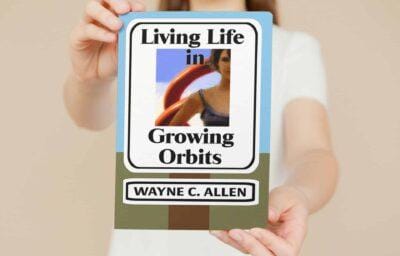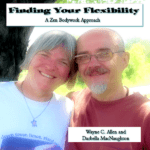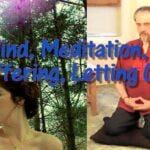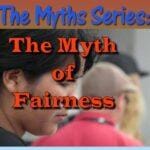Things Change When You Do — this is about is how we deal with events that seem larger than life.
Typically, these events are categorized as “This is not fair!”

Living Life in Growing Orbits is our workbook.
52 weeks of daily exercises designed to help you figure yourself out.
Check out Living Life in Growing Orbits on our site.
Direct link to Amazon
Purchase digital versions (Apple, Nook, Kobo, etc.) from this page
Gathered under the “larger than life” umbrella are things like death, illness, accidents, global catastrophes, abuse, and the like.
Darbella and I once led a seminar. One of the participants was dealing with a serious illness, and was in pain much of the time. I did a bit of Bodywork with her, to help her manage her pain so she could stay present in the group.

During one of the dialog sessions, two of the other participants started bemoaning the woman’s situation, talking about how unfair it was, how awful her situation was, how isolating pain was, and on an on ad nauseam.
As all of this wound down, I couldn’t help but wonder why people waste time and energy on “It’s not fair!”
From my vantage point, the participant was mostly present, was coping with her pain, and interestingly never agreed with either of her interlocutors.
I tend to be a simple Zen person.
I saw the participant as she was, and accepted her as she was. When her pain got to a certain point and she asked me to help with it, I did some Bodywork.
There was nothing else I could do.
Because “the way it is, is the way it is.”
And fairness has nothing to do with it.

When we were kids, we heard fairy tales about people living “happily ever after.” We were told that “…if you are good, the fairy godmother comes and gives you stuff.” We believed in Santa and the Easter Bunny.
Then, we grow up and give up on Santa, fairies, and the bunny, but neglect to let go of “magical thinking.”
Magical thinking makes the following link:
“If I am good, only good things will happen to me. For free. All the time.”
The other side of the coin is the idea that if “bad stuff” happens to someone, they must have “deserved it.”
Implicit in this kind of thinking is the idea that bad things only (or should only) happen to bad people.
If you hang around wakes or funeral parlors, and if the dead person died of anything other than of old age, you will hear some moron ask, “I wonder why God was mad at him. I wonder what he did to deserve this?”
Being a practical, Zen person, I wonder, “Why not this person?”
After all, Gandhi was assassinated, as were Martin Luther King, Jack and Bobby Kennedy, and a myriad of others. Did they “deserve it?” Of course not. Should they somehow have been exempt, given their lives of service? Of course not.
Did the woman in my first story receive “fair” treatment? There is no such thing. There is just the truth of her life — this happened and this happened and this happened.
The reality of our lives is that we live in the midst of pain, suffering, and death.
No being ever alive has escaped this.
Most of us will outlive our parents. Some of us will outlive our children.
There will be illnesses, accidents, pain. Wondering about “why” is simply an attempt to avoid confronting the reality of our impending death.
There is no why. When a tragedy happens, why do some live and some die? Were the survivors better people, or were they just lucky?
It is clearly the latter. The equation is simple: they got out, others didn’t.
That’s not fair!
Well, yikes. Says who, and on what basis? Magical thinking spins the whole thing back to, “It just shouldn’t have happened!” OK. But it did happen, so what’s the sense of putting energy into that thought?
Then, people go a step further and start, “The government is to blame! They should have stopped it from happening!” And what changes? Nothing! It still happened.

What’s really going on here is that no one likes to see people they care about in pain, sick, dying, dead.
That stuff is not supposed to happen, and if it does, “god” is supposed to make it happen to someone else. Ad the wailing and gnashing of teeth is directly connected to “The magic has failed!”
The only cure for all of this is the total acceptance of what is. From a place of acceptance, I can then choose to act differently, instead of just whining about unfairness.
Pain, for example, is one reality that touches all of our lives. For many, the pain will be physical. For all of us, there will be the emotional pain of grief and loss.
Pain is not optional.
Suffering, however, is optional.

Check out our program
Finding Your Flexibility.
Learn to deal with pain using tools such as Qi Gong, meditation, and Yoga.
All suffering is self-imposed. The Buddha’s first truth is, “Life is suffering.” But his second truth is, “All suffering is caused by clinging and aversion.”
Clinging, in our above examples, is clinging to magical thinking. Aversion is, in the pain example, the unwillingness to embrace (accept) the reality of the pain. The irony is that such aversion, and clinging, and denial is crazy making, mentally painful, and changes absolutely nothing.
Suffering comes from clinging to the past — wanting everything to be the way it was before the “bad” thing happened. (Are you seeing Disney movies running in your head?) This, of course, will not and cannot ever happen, no matter how much you wish it were so.
And so, you suffer.
Suffering comes from hating and resisting pain. Yet, the pain is real — is part of one’s reality.
Ram Dass once said (I’m paraphrasing),
“Life requires having a hot stone placed in your hand. You have two options. Grasp the stone and burn your whole hand, or hold the stone lightly and only burn the part under the stone. Choose.”
Most choose hardening and tightening around the pain, while adding in the “This isn’t fair” litany.
And so, you suffer.
So, what is the alternative?
The Buddha’s third truth: If you let go of clinging and aversion, and live your life fully and completely, you can let go of suffering (but not pain, sickness, and death — this is not optional!)
In other words, situations do not change — you do!
I am not minimizing pain — I am simply saying that it is “how it is.”
There will always be situations that are agonizing, there will always be depraved people preying on innocents, and tragedy and death are as much a part of life a blue skies and sunsets. Bemoaning the existence of such painful situations changes precisely nothing.
Acting to create another way of being with the situation is always possible.
The key to living life suffering-free is to hold life, and your opinions, loosely. While it is tempting to play the “It’s not fair” game, it is essential to remember that this accomplishes nothing (other than you get to gather a group around you to whine together and feel worse) in the real world.
The world is neither fair, nor unfair. The world is. As humans, we exist in a physical realm, where the outcome of life is death. Death is what we all hold completely in common. Accepting this reality, as well as our ability to deal with the pain that life brings, is essential for achieving Simple Presence.
Hold the burning stone loosely.





